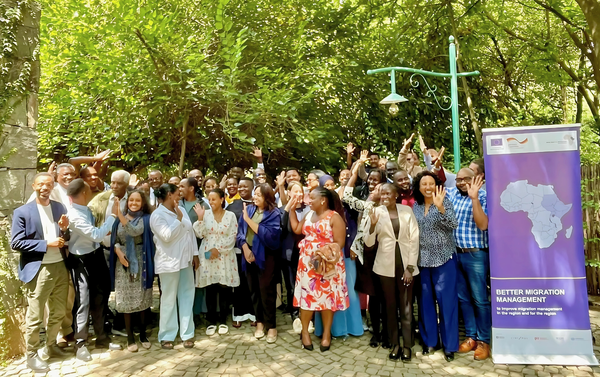East Africa’s anti-trafficking network strengthens its collaborative efforts

East African CSOs agree plans to build on previous successes at this year’s EHAAT Regional Forum, IJM calls for the just treatment of scam center workers following a crackdown in Laos, and a new report explores the connections between human trafficking and disability.
At their 7th Regional Forum in July 2024, civil society organizations (CSOs) from the East and Horn of Africa Anti-Trafficking (EHAAT) Network set out long-term goals and agreed to build upon previous successes, aiming to ensure that EHAAT’s future efforts are both impactful and sustainable. Facilitated by Freedom Collaborative, EHAAT’s new hosting organization, the forum took place in Kenya with additional online participation.
During the discussions, three main priorities were identified: fostering alignment and mutual understanding among EHAAT’s diverse members to ensure cohesive and context-specific interventions; utilizing data and evidence to inform strategies and enhance the effectiveness of anti-trafficking efforts across the region; and strengthening the capabilities of all EHAAT members through knowledge sharing and best practices, ensuring a more resilient and effective network.
The East and Horn of Africa Anti-Trafficking (EHAAT) Network is a regional network of more than 100 civil society organizations (CSOs) dedicated to enhancing regional cooperation in the area of protecting migrants and victims of trafficking and prevention of human trafficking in the East and Horn of Africa region. It was initiated in 2017 by the Better Migration Management (BMM) Programme, funded by the European Union and Germany. The BMM Programme facilitated the 7th Forum and has been providing technical and financial support to the CSOs over the past years. The network serves as a platform that enables these organizations to collaborate, share knowledge, and coordinate their efforts in addressing the complex challenges associated with trafficking and exploitation in the region. It brings together a diverse range of CSOs from Djibouti, Ethiopia, Kenya, Somalia, South Sudan, Sudan and Uganda, including grassroots organizations, advocacy groups, and service providers with a wide range of expertise and perspectives on migrant protection and counter trafficking, from legal support and policy advocacy to direct assistance and the creation of public awareness campaigns.
During the forum, EHAAT’s members, with support from Freedom Collaborative, led joint workshops and engaged in open discussions to build consensus on the network’s core strengths, aligning its strategy closely with EHAAT’s core mission and vision. These efforts also correspond with Freedom Collaborative’s mission to document and amplify the work of anti-trafficking CSOs worldwide, through the coordination of working groups, the facilitation of data sharing, and the publication of reports and thematic briefings, among other initiatives.
A working group discussion on economic empowerment during the forum, in which members shared best practices to create culturally sensitive and effective programs for survivors, offers an example of the way in which diverse perspectives can be harnessed by the network – by continuing to foster alignment among EHAAT’s members, it is hoped that collaboration and tailored responses across different regions will be enhanced. And a 2022 regional mapping report produced with data collected and recorded by more than 30 CSOs working in the area, organized with support from the BMM Programme and Freedom Collaborative, provides another success to build upon. The report offered fresh information on migration patterns in East Africa, demonstrating how collaboration can support positive outcomes – by utilizing accurate data to inform strategies and enhance the effectiveness of interventions, EHAAT hopes to drive targeted, evidence-based actions that address the root causes of trafficking. Meanwhile, regular CSO calls, which network members take turns to lead and host, and which provide a platform allowing members to share expertise, discuss challenges, and improve practices, were acknowledged as a way in which to strengthen the network’s overall capabilities, increase the skills and resilience of member organizations, and foster a more adaptive and coordinated response to challenges; by continuing this approach, EHAAT hope to carry on building a resilient, well-equipped network capable of responding to evolving challenges.
The participating EHAAT members also discussed the need for the ongoing commitment and engagement of member organizations, as well as increased resource mobilization to seek funds for initiatives, and partnerships with donors and other institutions. Freedom Collaborative will continue to assist EHAAT by establishing platforms for meetings, trainings, and knowledge exchange, and supporting its commitment to open communication and organizational sustainability.
Here’s a round-up of other noteworthy news and initiatives:
International Justice Mission has urged the Laos Government to implement a robust victim identification process for thousands of workers due to be released from online scam centers, following the Government’s announcement of the forced closure of compounds in the notorious Golden Triangle Special Economic Zone. Citing cases in which trafficking victims are wrongly identified as criminals, the group highlighted victims’ need for support, protection and access to justice.
The UN Special Rapporteur on trafficking in persons, especially women and children, Siobhán Mullally, has released her latest report, calling for greater focus in the peace and security agenda on the trafficking of women, and reflecting on the ways in which gender shapes the experience of conflict, insecurity and injustice.
U.S. Customs and Border Protection (CBP) has modified the Withhold Release Order (WRO) issued in 2020 against imported seafood products made wholly or in part with seafood harvested by Yu Long No. 2, a Taiwanese flagged fishing vessel. CBP says it will no longer detain shipments of seafood products harvested by Yu Long No. 2 at U.S. ports of entry, as a result of the ship’s actions to remediate forced labour indicators within its fishing process.
The Organization for Security and Co-operation in Europe (OSCE) has released Invisible Victims: The nexus between disabilities and trafficking in human beings, exploring the ways in which disability increases vulnerability to human trafficking; disability as a result of trafficking and exploitation; the intersection of disability and disaster; and the visibility of disability in justice systems.
Technology non-profit Thorn reveals in a new report that some areas of concern, such as the growing threat of youth creating deepfake nudes of peers, are emerging as quickly as the technologies that enable them. While many youth online attitudes and behaviors remain constant, such as navigating sexual interactions with adults and self-generated child sexual abuse material (SG-CSAM), the powerful capabilities and efficiencies of AI are leading to alarming new behaviors and risks, the report finds.
This video recording of an online panel event from Freedom United on Trafficking and the Olympics explores the French authorities’ “social cleansing” efforts to project a polished image for Paris 2024, and how they have increased risks to survivors and risks of exploitation.
Dozens of workers from around the world may have been trafficked into the UK to work for a small family-owned Scottish fishing firm, a BBC investigation has revealed. Thirty-five men from the Philippines, Ghana, India and Sri Lanka, employed by TN Trawlers and its sister companies, were recognized as victims of modern slavery by the UK Home Office after being referred to it between 2012 and 2020. The company was the focus of two long-running criminal investigations, however no cases of human trafficking or modern slavery have come to trial, although some of the men waited years to give evidence.
The Freedom Fund and United Nations University Centre for Policy Research (UNU-CPR) will launch their new report exploring the hidden struggles of the estimated 850 million people worldwide who lack official identity documents, at an online event on 9 September at 2pm BST. The event will be hosted in English, with Nepali and Portuguese interpretation.




